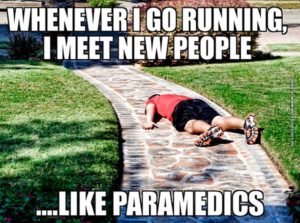
Most people have a love-hate relationship with running. They use it to lose weight, prepare for a run and so on.
Everybody hates it, I’ve never met a runner who claims that he likes running. “I hate it but I like winning a marathon one day” that’s what a buddy of mine told me.
He looks pretty skinny and a bit unhealthy too, to be honest. It’s like his body can’t cope with all the stress due to the running. He claims that he gets the runners kick but I don’t know if this is something positive.
Ever saw the comparison between the marathon runner and the sprinter? They ask you who you want to be. Most of us will tell you that they want to look like a muscular sprinter.
Once they made their decision they go for a nice long run, the fourth this week. They’re spiking the cortisol levels in their body, making sure that they don’t look like the sprinter at all.
I never liked running. I only liked it when it involved something else like soccer, hockey…
So we can’t do normal runs anymore? We can only sprint to keep our testosterone high?
Well no you still can do a normal run if you want to. But more on that later in this blog, first we’re going to take a look at how running can influence your testosterone.
Long-distance running is a bit like chasing girls, you keep doing it and you gain nothing from it.
Besides that it’s important to keep in mind that cardiovascular exercise is good for your heart health, metabolism, hormonal profile(if you don’t overdo it), recovery ability and your immune system.
Running a lot makes you run out of testosterone
Ryan Hall retired this year and he was a famous marathon runner. He is still the only one who completed a half marathon in less than an hour. This is pretty impressive but when Ryan Hall retired he told that his years’ long performance rut was due to chronically low testosterone levels.
The ending of his career (the last four years) was filled with injuries and disappointments so he decided to quit and let his body rest. He told that his chronically low testosterone levels were the reason that he behind the decision.
Now don’t be surprised because this is a solid reason to pull the plug. Low testosterone is extremely dangerous for men and should be avoided at all costs. Ryan admitted that it was extremely frustrating but he didn’t get why this had happened. He just had his blood work multiple times and the result was always the same: chronically low testosterone levels. He told that it was frustrating that he lost all his training gains due to sudden fatigue. This fatigue required complete rest and resting is the most horrifying thing for an athlete.
Now don’t be surprised about his low levels, when you train you to put your body under lots of stress. Running is very tough on the body and many people will think that they will wreck their knees. In reality, you’ll wreck your hormones if you run long distances over and over again. Ryan Hall is a living example of this. His body just couldn’t handle the stress anymore.
Running and testosterone: the science behind it
There was a study that was taken in a university in Brazil where they monitored the testosterone levels the day before and after a marathon. They took 20 men to investigate this and the results were pretty shocking.
They noticed that the runners their testosterone levels dropped by 50% and their cortisol went up by 50%. The cortisol even stayed high the day after the race but it doesn’t stop there. They noticed that there were higher levels of two enzymes, lactate dehydrogenase (LHD) and creatine kinase (CK). Scientists linked both enzymes, with muscle tissue damage and breakdown. The levels were high after the race and became even HIGHER the day AFTER the race.
Symptoms and recovering from overtraining
But how do I know that I’m overtraining? It’s pretty simple, five symptoms can make you conclude that you’re overtraining. You don’t have frequent morning erections or none anymore
- You’re tired all the time
- You lose strength and can’t perform anymore
- Loss in muscle mass
- Loss of sex drive
I have had symptoms of overtraining after I finished Arnold Schwarzenegger his training program and I was injured. To get back on track, I had to take six weeks off. You can probably take less time off but four weeks is a minimum. It all depends on how long you were overtraining and how well your body can recover after being overtrained.
Research showed that it can determine the gender of your offspring
They did research where they took 139 runners and divided them into three groups. The first group was not training when they conceived a child. The second group was running between 0 and 30 miles per week when their partner got pregnant. The final group was the ones who were running the most; they ran between 30 to 50 miles per week. There were a total of 377 children born in this investigation.
The first two groups proved that they had a bigger chance to have a male offspring, 62% were males.
In the third group, their changes dropped about 20%, only 40% of their offspring were male. So there could be a correlation between long-distance running and the gender of your offspring.
Your heart suffer big time when you do long-distance running
Although that I early stated that endurance training can be extremely beneficial for your heart health you’ll have to watch out. You’re increasing your risk of a heart attack seven times when you perform frequent long-distance running. This study was presented at the Canadian Cardiovascular Congress in Montreal.
They also stated that regular exercise reduces cardiovascular risk by a factor of two or three. So if you do it right you’ll feel right.
Another study concluded that 50% of a population of marathon runners showed some heart muscle scarring. This was especially in men who trained the longest and hardest.
- The tissue breakdown leads to excess cortisol and this contributes to catabolism and chronic disease.
- Microscopic, this means that you have trouble healing the tears in your muscle fibers. If you continue to over-exercise this will increase the risk of injuries.
- Your immune system will be weaker
- Insomnia, the risk is even bigger when you train later during the day.
The good forms of cardio
- Hill/incline sprints
- Jump rope
- boxing
- HIIT cardio workout
- Running (yes running can be beneficial if you do it right)
Hill sprints and sprints in general
Sprinting is great, I always liked sprinting more than I liked running. It cool to compete with friends and give it your best over and over again. I try to aim at the length of a soccer field if I do hill sprints You can do 10 hill sprints with a break of a maximum of three minutes. I mostly sprint up and walk down and once I’m back down, I’ll go back up.
My other sprint workout is one that lasts for 10 to 15 minutes. I’ll set my timer and sprint the length of the short side of a soccer field. Then I’ll run back at a slower tempo, a bit faster than walking, I’ll continue for 10 to 15 minutes.
So why sprinting? Well one hour after a sprint session your HGH (human growth hormone) is still elevated.
HIIT cardio is also the best training that you can do to make your calf muscles grow.
Jump rope
It’s simple and it’s a real killer. When I’m not doing a short sprint session I’ll go for a HIIT jump rope session. I’ll jump for 30 seconds and after that, I’ll take 30 seconds rest. This workout lasts for about 15 minutes.
This workout is easy and can be done everywhere, the only thing you need is a jump rope. You can buy a cheaper plastic one or one with ball bearings.
Shadowboxing or punching a bag
I know it looks silly but shadow boxing is brutal, I’ll use the same principle as when I do rope jumping. Sometimes I’ll add burpees, 180 squats and so on just to switch things up.
HIIT cardio workouts
This was already covered in the previous form of cardio and my calf training article. Next time I’ll release an article on how you can prepare yourself when you participate in an obstacle run, this without wrecking your hormones.
Running
You can keep on running if you like it but you’ll have to go down a notch. Running can supercharge your erection, strengthen your sperm or do the opposite.
There’s a study that concluded that two hours of running per week could benefit your erection. Note that they didn’t combine the running with weightlifting or calisthenics. I would aim for one or two running sessions per week that last 30 minutes max, so one hour running per week. you can also do three 20 minute jogs if you decide you don’t want to do sprint or HIIT workouts.
A study with young men showed that the most inactive ones had low sperm count. So this means that being active increases your testosterone and your sperm health. There’s a link between testosterone and your sperm health so I see no reason to stay a couch potato.
Conclusion
Don’t run because your body thinks it’s no fun.
Sprint Forest Sprint.
Moderation is the key, my friends.
Till next time
Alex
Subscribe if you haven’t already or follow me on Twitter, Instagram, Facebook, and bloglovin.
You can also follow me on snapchat my username is: alexdw92
Resources
http://www.pponline.co.uk/encyc/0076.htm#
http://www.runnersworld.com/health/training-and-low-t-understanding-the-link
http://www.menshealth.com/fitness/how-running-affects-your-penis-and-balls?cid=OB-_-MH-_-CHRR



Interesting how moderation is key to so many things! Thinking about adding light jogging to my routine, slightly different parameters though maybe 20 mins 3 times a week just to get the blood flowing. At the same time I hate running so we’ll see.. It’ll take some dedication. Great article and lots of good info!
Thank You. You could do that, You don’t have to run till You drop dead. Maybe do sprints in One week and Some runs in the other week? Switching things up always works